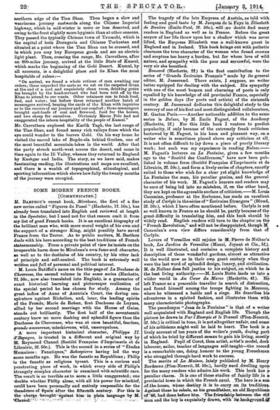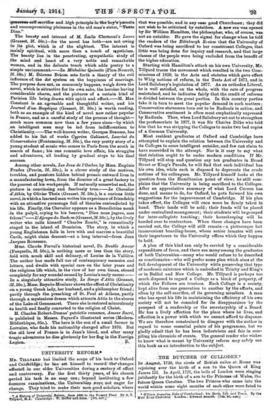SOME MODERN FRENCH BOOKS.
[COMMUNICATED.]
K. Bstalton's -recent book, . Mirabeau, the first of a fine new seriessalled "Figures du Passe " (Hachette, 7f. 50c.), has already been translated into English and reviewed at length in the Spectator, but I need not for that reason omit it from my list of good French books. It is an excellent biography of the .brilliant man who, with more moral weight of Lis own and the support 'of stronger King, might possibly bate saved France from the Terror. As to public matters, K, Barthon deals-with his hero according to the beet traditions of French statesmanship. From a private point of view be insists on the irreparable harm-done to Mirabean's ownifarne and character, as well as to the -destinies of his country, by his utter lack of principle and . self-control. The hook is extremely well written and full of personal and political interest.
M. Louis Batiffol's name on the title-page of La Duehesee de Chet:reuse, the second volume in the same series (Eachette, Pt. 50c., now also translated into English), is a guarantee of exact historical learning and picturesque realization of the special period be has chosen for study. Among the great ladies of Anne of Austria's Court, the daring con- spirators against Richelieu, and, later, the leading spirits of the Froadei Marie de Roban, first Dnebease de Luynes, allied -by her second marriage with the House of Guise. Ittande out brilliantly. The first half of the, seventeenth century knew no more dashing and splendid figure than the Duchesse de Chevreuse, who was, at once beautiful, fearless, grandeameurease,mischievous, wild, unscrupulous. A more important historical character, Philippe II. 4; Espagne, is treated in a different and original way by X. Raymond Clauzel (Societe Francaise d'Imprimerie et de Librairie, 3f. 50c). This is the second in a series of -" ttudes Humaines Fanatiques," Robespierre having led the way some months ,ago. He was the fanatic se Republican ; Philip is the- lanatie as religious tyrant. This is a curious and penetrating. piece of work, in which every side of Philip's istringely eomplex character is examined with scientific care. The result is so -terrible as. to seem a little exaggerated; one -doubts whether Philip alone, with all his power for mischief, could have been personally and entirely responsible for the 'decadence of Spain after the fifteenth eentury. For this is the °beige 'bronfilit,ligninst bira, in plain language by IL. The tragedy of the late Empress of Austria, as told with feeling and good taste by IL Jacques de la Faye in Elisabeth de Bariere (Smile.Pard, St. 50c.), -will ,..no doubt find many readers in England as well as in France. Before the great sorrow of her life threw upon leer a shadow which was never lifted, the Empress Elizabeth wee a well-known guest in England and in Ireland. This book kings out with pathetic clearness the true character of the woman who found crowns and sceptres too heavy a burden, but for whom love of wild nature, and sympathy with the poor and serrAwful, warn the very air she breathed.
Ransarti (Hachette, H.) is the first contribution to the series of "Grande Ecrivains Francais" made by its general editor. H. Jusserand. There exists, I suppose, no writer better equipped for dealing with the subject. His sympathy with one of the most 'human and charming of poets is only equalled by his knowledge of old provineial France, especially in the golden days (for poets and artiste) of the sixteenth century. H. Jueserand dedicates this delightful study to the memory of one of his first and most distinguished collaborators, M. Gaston Paris.—Another noticeable addition to the same series is Balmy, by K. Emile Faguet, of the Academy (Rachette, 2f.) For this little book I venture to prediet popularity, if only because of the extremely frank criticism bestowed by M. Fagnet, in his keen and pleasant way, on a writer who is sometimes placed above any criticism at all. It is not often difficult to lay down a piece of purely literary work; but each was my experience in reading Beleac.- K.
Fagaet'e lectures on La Fontaine, given a few months ago to the "Societe des Conferences," have now been pub- lished in volume form (Societe Francais(' d'Imprimerie et de Librairie, fit 50c.), and form a lively series of ehapters, exactly suited to those who wish for a clear yet slight knowledge of La Fontaine the man, Ids peculiar genius, and the general character of his work. M. Faguet's hearers and readers may be sure of being led into ne mietakes, if, on the other hand, they are _kept on the agreeable surface of criticistn.----M. Louie Cazamian, professor at the Sorbonne, has made an excellent study of Carlyle in these:ifs of" &drains FArangere " (Bleu& 2f. 50c.), which I have often mentioned before. Carlyle is no); so well known in France as he should be, partly because of the great difficulty in translating him, and ibis book should Ve widely read. English readers will turn to the chaptermi the "Frenoh Revolution," and will not be disappointed, :tholigh Cazamlan's own view differs considerably from that oT Carlyle.
Lovers of Versailles will rejoice ha 1:1. Pierre de Nolhada book, Les Jardine de Versailles (Manzi, Joyaat et Cie, 5f,). It is well illustrated, =a contains a complete history and description of those wonderful gardens, almost as attractive to the world now as in their OW,1 great century when they were the last word of splendid design, Inxury, and civilization. H. de Rothe° does full jtudice to his subjeet, pp which he is the best living autltority.--hf. Louis Botte leads us into a wilder world in Au Omer Ars Maroc (Hachette, 4f.). * left France as a peaceable traveller in search of distraction, and found himself among the troops fighting in _Morocco, where he witnessed a battle and a siege. He describes his adventures in a spirited fashion, and illustrates there with many characteristic photographs.
The pseudonym "Jean de la Fontaine" is that of a writer well acquainted with England and English life. Though the picture be draws in Par l'Rnergie et le Travail (Plon-Nourrit, Of. 50e.) is critical in tone, it is raotaltogether unfair, and some of his °tithes= might well he laid to heart. The book is a lively account of ten years of the writer's ,youth, during part of which be tried by different means to gain his living, mostly in England. Pupil of Corot, then artist, artist's model, dook labourer, sailor, teacher of languages aelf -taught—the record is a remarkable one, &ring tonour to the you,ug Frenclumao who struggled through-hard work to success.
The merits of Ira Wawa, lately published by K.Timmy
Bordeaux (Plon-Nourrit, 8f. 50c.), hardly need gpon for the many readers who admire his work. This book Ws it peculiar charm. It is one of those studies of family life in jb provincial town in which the French excel. The hero is a sea .of.thehouse, .whoe slestiay it in te- carry .on its tradition*. Against these he rebels, as his grandfather, an old Republican of V, bad done before The friendehip between the old Man and the boy is exquisitely drawn, With ite hackfffann4e4t :getiereas self-eaerifice and high Prfaciple:intfie-boy's 'Arent" . and uncompromising plainness in the old man's sister, "-Tents
Dine." •
The beauty and interest of M. Emile Clermont's Laura' (Gressel., 3f. 50c.)—for the novel. has both—are not owing to ithi Plot, which is of the slightest. The interest ia. mainly spiral*, with snore than a touch of mysticism. The beauty lies, in the penetrating, sympathetic) study of the mind and heart of a very noble and. remarkable woman, and in. the delicate touch which adds poetry to a 'simple mayixonment.--In Micheline Quineffe (Plon-Nonrrit, 3f. 50c.) M. Etienne Brioon sets forth a theory of the evil influence ud the dot system on the happiness of marriage. The purpose does not, as commonly happens, weigh dawn the novel, which is attractive for its own sake, the heroine having considerable charm,, and the pictures of a certain kind of Parisian life being drawn with spirit and effeet.—M. Max Constant is an agreeable and thoughtful writer, and his * Journal tt'uno ficeptigus (esrasset, 3f. 50a) is worth reading, both as an example of. the kind of novel non rather popular in France, and as a careful study of the process of thought— much more common now than a few years since—by which an intelligent man may be led from indifferentism. to Christianity.—The well-known writer, Georges. Emma, has ! added to his list of works Gyprfea Galissert, Lauriat du' Conservatoire Fontemoing, 3f. 50e.), the very pretty story of a young student of mnaie who comes to Paris from the mouth in search of lame; his one romantic love .affair, his struggles and adventures, all leading by gradual steps to his final.
Among other novels,. Les Jena de PUmice, by Mme. Eugenie Pradez (Perrin,. 3f., 50e.), is a .clever study of the motives, troubles, and passions hidden behind prosaic outward lives in a-manufacturing town, from the director of. a great factory to the poorest of his workpeople. If uaturally somewhat sad, the picture is convincing and fearlessly true.—Le Chevalier 4'Athis) by Olivier Their (Graseet, 3f. 50c,), is a curious little novel, in whicha learned man writes his experience of friendship with an attractive personage full of theories contradicted by his life. Finally, the Chevalier appears as a Benedictine monk in the pulpit, crying to his hearers, "Dieu none jugera, mes freres!"--.L"4joupa do Sedum (Grasset,3f. 50c.)„ by, the lively writer who gala himself "Charles Zombi," is romantically staged in the island of Dominica. The story, in which a young Englishman falls in love with and marries a beautiful .Carib, might claim descent—at a long interval—from Jean .Jaccinee Rousseau.
Dime. Claude Ferval's historical novel, the Double Amour ,(Fasquelle, 3f. 50c.), is nothing more or lees than the story, .told with much skill and, delicacy, of Louise de la Valliere. The author has made full use of contemporary memoirs and letters, and (livens with special care on the later years and the religious life which, in the view of her own times, atoned -completely for any' scandal caused by Louise's early career.-,-7— In a singularly attractive study, Le Bongo d'Aitis (Grasset, 3f, 50c.), Mine. Reynes-Monlanrshows the effect of Christianity on a young Greek lady, her husband, and a.philosopher friend ; 'partly through the preaching of St. Paul at Athens, partly through a mysterious dream which attracts Attie to the shores of the Lake of Gennesaret. There she is restored miraculously to health and finally converted to the religion of Christ.
. M. Charles Robert-Dumas' patriotic romance, Amour. Bacro, -is published in Messrs. Fayard'e illustrated series (Modern, Itibliotheque,..95e.). The hero is the son of a small farmer in .Lorraine, who finds his nationality changed after 1870. But the old love of France- Is in dean's blood, and after .1=1v tragic adventures he dies gloriously for her flag in the.Foreign



















































 Previous page
Previous page